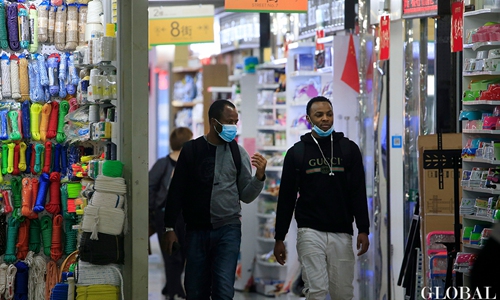HOME >> SOURCE
China keeps global supply chain running
By Wang Cong in Beijing, Huang Lanlan and Yang Hui in Yiwu Source:Global Times Published: 2020/3/26 20:58:41
Accelerating domestic activities to lift global economy out of crisis: analyst

Workers of HC Semitek, a leading Chinese LED chip maker, produce chips at its subsidiary in Yiwu in East China's Zhejiang Province. Photo: Yang Hui/GT
In the manufacturing and export hub of Yiwu, in East China's Zhejiang Province, a small factory has resumed full production so that children in Africa will have notebooks when they start school in fall; machines at the Yiwu Railway Port are running almost non-stop to load containers onto trains bound for Europe so that people there will have desperately needed essential supplies in time. Last week, China sent a charter cargo jet to bring materials to Myanmar so that local garment factories can return to normal operation and hire workers. Planes carrying Chinese made medical supplies have been landing in countries around the world and even personally welcomed by presidents and prime ministers.
These are vivid anecdotes of how China, with its massive manufacturing and logistics sectors and other resources, has been trying to restore the supply chain for not only medical equipment to help countries combat the coronavirus but also almost everything from garments to electronics to cars to help revive economic activities around the world, Chinese businesses and analysts said on Thursday.
Contrary to a narrative fiercely pushed by some anti-China pundits and anti-globalization groups overseas that disruptions to global supply chains caused by factory closures in China threaten the global economy, China is the only primary force that can and is trying to jumpstart the global economy in this crisis and calls for disengagement from China are not only wrong but also dangerous at a time when the world needs collaboration, the analysts said.
Addressing a rare virtual G20 leaders' summit over the global pandemic on Thursday night, Chinese President Xi Jinping said that the outbreak has disrupted production and demand across the globe, and called on countries to jointly maintain the stability in the global industrial and supply chains.

At a restaurant owned by foreigners in Yiwu, East China's Zhejiang Province, a waiter talks to his friend. As the COVID-19 outbreak subsided, the night market in Yiwu resumed operations. Photo: Yang Hui/GT
Restoring supply chains
Even when the country continued to combat the coronavirus epidemic in Hubei, which was hit hardest in the country, Chinese officials started to roll out a series of measures in mid February, including support in capital, labor and logistics, to help businesses and companies outside of Hubei to resume operations and production. Officials in Yiwu took one step further by sending buses to places across the country to pick up workers when strict lockdowns were still in place.
With those efforts, companies such as Yiwu Zhong Cai Printing, which makes notebooks, have been able to resume full production even as the virus continues to spread across the world. "We resumed production on February 20 and 100 percent of our staff have returned to work. Machines are running 24-hours a day and we have even raised bonuses as incentives for workers," Tian Jicheng, owner of the firm, told the Global Times, adding that the company is rushing to produce export orders of about 30 million yuan ($4.23 million) for several African countries.
Tian said that the notebooks will be transported by cargo ships, which will take two months to reach Africa as by then, restrictions at ports as result of the outbreak in some African countries will be lifted. "The notebooks are for September when school starts," he said.
While that schedule works for Tian's notebooks, it would definitely not work for essential supplies such as surgical masks, gowns and gloves. That is why Yiwu has maintained its freight train services to Europe throughout the epidemic. As of Wednesday, despite the lockdowns and business closures, there have already been 60 trains between Yiwu and Europe so far this year, according to an official account. Some of the trains carried medical supplies to Spain and other countries.
"I don't know what these conclusions are based on. What I see is that China, with its success in containing the epidemic and restarting the economy, is actually the only one trying to restore the global supply chain," Cao Heping, an economist at Peking University in Beijing, told the Global Times on Thursday, referring to suggestions that disruptions to global supply chains caused by China are dragging down global growth.
Aside from critical medical supplies, China has also been trying to supply essential raw materials for factories in Southeast Asia to help the local economy and workers. Last week, China sent a cargo plane carrying 15 tons of materials to Myanmar to help the country to reopen its garment factories and Chinese officials said that there would be more of such measures.
The move also highlighted the fact that despite calls by some US officials for companies to move production out of China to other parts of the world such as Southeast Asia, many will still depend on China one way or another.
China is not only the biggest exporter of manufactured goods, but also the largest exporter of intermediates used by factories around the world, accounting for 32 percent of the world's total, according to a report from the Asian Financial Cooperation Association in February. Specifically, China is a major supplier of materials or components for sectors such as electronics, automobile, machinery and textile sectors, the report said. For instance, China supplies 45 percent of the world's textile materials.

Photo: Yang Hui/GT
Global efforts needed
"Honestly, these suggestions of disengagement are not even worth a response because they are against any economic theory and will never work. The fact is that China is still irreplaceable in the global supply chain for a lot of things and the only right path is to work with China to get the global economy back on track," Cao said, noting that China is already leading the world in such efforts.
While economic activities in many countries around the world, including major economies such as the US and Europe remain closed due to the pandemic, China, the world's second largest economy which contributed to 30 percent of the global GDP growth last year, is gradually returning to normal.
As of Tuesday, nearly 72 percent of the country's small and medium-sized enterprises (SMEs) have returned to operation, up 42.1 percentage points from February 23, Qing Zhihui, an official with the Ministry of Industry and Information Technology, told a press briefing on Wednesday.
Overall, more than 70 percent of the Chinese economy has been revived, with some areas seeing more economic activity than others, according to some estimates. Even Hubei has started to resume work after a lockdown was lifted.
"Just like China being the first country to come out of the epidemic crisis, the Chinese economy is also the same and that is not only good for China but the world economy as well," Cao said.
As many export orders were completed before the Chinese New Year holiday and many factories have resumed work, there have been no major shortages in key materials for sectors such as textile and electronic components. However, many Chinese firms are facing declining export orders due to the pandemic, according to officials and businesses.
"The situation is indeed quite serious [because of the external environment]," an official in Yiwu told the Global Times on Thursday, referring to declining orders from overseas due to business closures in European countries and elsewhere. Yiwu is also a major supplier of textile materials to garment factories in Southeast Asia and Europe.
"The global supply chain is a matter for the entire globe. China has been resuming work but if businesses overseas are closed, that wouldn't work. That's why we need all countries to come together and contain the virus as soon as possible before it causes more lasting damage to the global supply chain," Cao said.
Posted in: ECONOMY